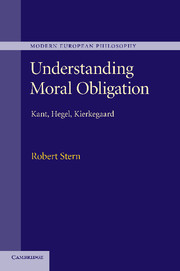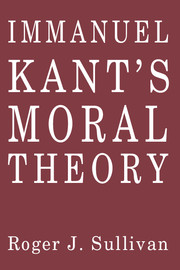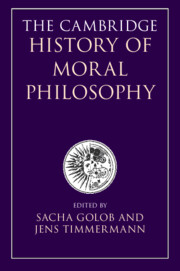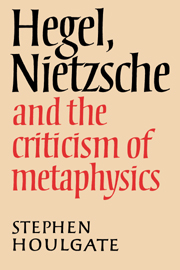Understanding Moral Obligation
Kant, Hegel, Kierkegaard
Part of Modern European Philosophy
- Author: Robert Stern, University of Sheffield
- Date Published: August 2014
- availability: Available
- format: Paperback
- isbn: 9781107434400
Paperback
Other available formats:
Hardback, eBook
Looking for an inspection copy?
This title is not currently available on inspection.
-
In many histories of modern ethics, Kant is supposed to have ushered in an anti-realist or constructivist turn by holding that unless we ourselves 'author' or lay down moral norms and values for ourselves, our autonomy as agents will be threatened. In this book, Robert Stern challenges the cogency of this 'argument from autonomy', and claims that Kant never subscribed to it. Rather, it is not value realism but the apparent obligatoriness of morality that really poses a challenge to our autonomy: how can this be accounted for without taking away our freedom? The debate the book focuses on therefore concerns whether this obligatoriness should be located in ourselves (Kant), in others (Hegel) or in God (Kierkegaard). Stern traces the historical dialectic that drove the development of these respective theories, and clearly and sympathetically considers their merits and disadvantages; he concludes by arguing that the choice between them remains open.
Read more- Shows how Kant's controversial notion of 'self-legislation' has been misunderstood
- Will interest those concerned with the history of modern ethics
- Traces the historical dialectic that drove the development of the respective theories of Kant, Hegel and Kierkegaard
Reviews & endorsements
'In his thoroughly researched and tightly argued new book, Robert Stern proposes that the 'standard story' of Kant as an ethical constructivist - in particular, the idea that Kant rejected value realism as a threat to autonomy - is seriously misleading … Stern's book is a model of how systematic philosophy can be fruitfully pursued in dialogue with historical sources without doing violence to the historical particularity of those sources.' Philosophy in Review
Customer reviews
Not yet reviewed
Be the first to review
Review was not posted due to profanity
×Product details
- Date Published: August 2014
- format: Paperback
- isbn: 9781107434400
- length: 292 pages
- dimensions: 229 x 152 x 15 mm
- weight: 0.4kg
- availability: Available
Table of Contents
Acknowledgements
References and abbreviations
Introduction
Part I. Kant:
1. Kant, moral realism, and the argument from autonomy
2. The argument from autonomy and the problem of moral obligation
3. Kant's solution to the problem of moral obligation
Part II. Hegel:
4. Hegel's critique of Kant (via Schiller)
5. Hegel's solution to the problem of moral obligation
Part III. Kierkegaard:
6. Kierkegaard's critique of Hegel
7. Kierkegaard's solution to the problem of moral obligation
Conclusion: from Kant to Kierkegaard - and back again?
Bibliography.
Sorry, this resource is locked
Please register or sign in to request access. If you are having problems accessing these resources please email [email protected]
Register Sign in» Proceed
You are now leaving the Cambridge University Press website. Your eBook purchase and download will be completed by our partner www.ebooks.com. Please see the permission section of the www.ebooks.com catalogue page for details of the print & copy limits on our eBooks.
Continue ×Are you sure you want to delete your account?
This cannot be undone.
Thank you for your feedback which will help us improve our service.
If you requested a response, we will make sure to get back to you shortly.
×





